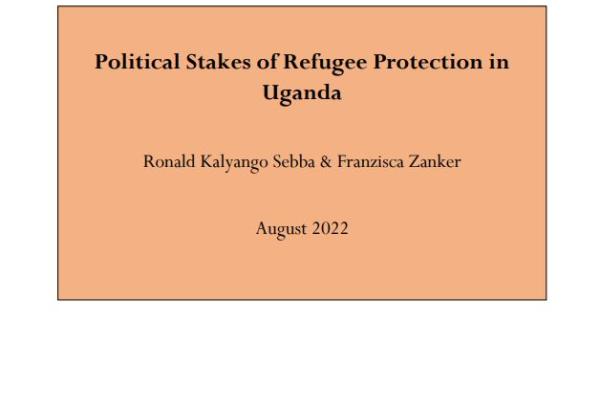
Zanker, Dr. Franzisca / Dr. Ronald Kalyango Sebba (2022): Political Stakes of Refugee Protection in Uganda. ABI Nr. keins, Freiburg.
Abstract:
Uganda is well known as a strong refugee protector, but faces a number of socio-economic and governing challenges, as well as complex political priorities and relationships. Based on our research on the political stakes of refugee protection in Uganda we found:
1. Refugee protection in Uganda follows a development approach that emphasizes refugee self-reliance by providing access to land for subsistence farming, as well as primary education and health facilities within settlements. A number of refugees are self-settled in urban areas, resulting in practical struggles such as police harassment, limited access to healthcare, jobs, livelihood opportunities and vocational training programmes. Institutionally, refugee governance in Uganda is constrained by highly centralized decision-making and underfunding of refugee hosting districts. Settlement-based land policies limit refugee choice and have been difficult to sustain due to growing numbers of refugees and growing tensions with host communities. The development approach avoids any potential political integration of refugees.
2. Domestically, there is a political trade-off between the idea that welcoming refugees would develop the country and the cost of hosting the growing number of refugees given limited international aid. The refugee situation is not rhetorically very securitised as the humanitarian narrative is still dominant, though there is a slowly growing narrative that refugee numbers are too high.
3. Uganda's open-door policy has attracted positive international attention, contributing to improving bilateral relations as well as the country's geopolitical leverage in the region. It also helps take attention away from the country’s domestic politics characterised by political oppression and human rights violations.
4. The relationship between the international and national community, primarily the OPM (as a representative of the government) and UNHCR (as a representative of the international community and refugee interests) is characterized by tension and co-dependency. At the local level there are disputes between local and national actors over decision-making powers when it comes to refugee protection, refugee numbers as well as underfunding of district administrations, who are only incrementally being involved in decision-making.
5. Despite formal mechanisms for refugees to communicate and coordinate with local and national authorities there is still a general feeling of exclusion amongst refugees and no real political role for refugees.
6. There is growing concern among locals about the government's open-door policy, reflected in sporadic clashes with refugee populations over access to resources, social services, environmental destruction, land and opening borders amidst the COVID 19 pandemic.
to the article: https://www.arnold-bergstraesser.de/en/political-stakes-of-refugee-protection-in-uganda
to the research project: https://www.arnold-bergstraesser.de/en/projects/research-project-on-displacement-in-africa
Date of publication:
Forschungsbereich:
Patterns of (Forced) Migration
Language: English
Full Publication
